It was Newcastle Gamers’ second all-day session of the summer this weekend. (Or — if you define your seasons the same way as Mrs Shep does — possibly the first all-day session of the autumn). Due to an adverse early-morning encounter with a chopping knife (it’s a long story, and not entertaining enough to recount here), I arrived a little bit late, and pretty much everybody else was already ensconced in their first game of the day. Fortunately, John B. (our illustrious chairman) was also running a little bit behind schedule, and arrived at roughly the same time that I did – leaving two of us in search of a game. This seemed like an ideal opportunity to crack open my 2-player euro of choice: Agricola: All Creatures Big and Small.
The game was unpacked, I’d explained pretty much all of the rules, and we were about to commence playing when… some more people arrived. It turned out to be 3 first-timers, and – obviously – it would be a bit rubbish of us to leave them to their own devices (especially since none of the other games in the room were likely to finish any time soon) … so ACBAS went back into the box, and we introduced ourselves to the new arrivals.
But what to play? Some gentle probing revealed that our new arrivals had a little bit of experience under their belt, mostly with gateway type stuff. John B. suggested that Hoity Toity might be a good choice — I’ve never played it before, but it’s one of the SDJ-winning “classics” that I’ve always thought I should get around to trying one day, and it seemed a good fit for the situation… so that’s the one that came out first
OK — technically — we played Adel Verpflichtet, since John has a German edition of the game … but it’s not particularly language dependant — and aside from my mixing up an Austellung with an Auktionshaus near the start — the text wasn’t a problem.
Hoity Toity is a game by Klaus Teuber (AKA “the Settlers of Catan guy”), in which members of English aristocracy compete to acquire various items of junk (sorry, antiques) from an auction house, burgle particularly old and precious items of junk (sorry, antiques) from each other, and ultimately stage exhibitions their assembled collections of junk (/antiques) at the castle for points. the dominant mechanisms are simultaneous action selection, set collection, and blind bidding. There are some (extremely euro-style) catch up tweaks to make sure nobody gets left too far behind, and — basically — whoever puts on the most/best exhibitions will get to the end of the scoring track first and be victorious.
I really enjoyed this game — I’ve heard the action-selection part of this game criticised as just being a souped up version of rock/paper/scissors … but I think it’s way more deductive than RPS; there are various reasons why a particular option will (or won’t) be attractive (or even available) to your opponents at particular points in the game, and you can use this information to help you choose your own actions.
I tended to stick to the statistically-prudent path on most of my turns — throwing in the odd dummy play when I thought I was becoming too predictable — and it seemed to work in my favour; I won with a pretty big lead. I guess that with repeat play, a group might learn to play more randomly / less predictably … but playing randomly *also* means playing sub-optimally, so there’s an interesting balance to strike there.
Overall, I was impressed; it’s got all the ingredients of a classic “vintage” euro, and its easy to see how it picked up the Spiele Des Jahres when it did. It was a *perfect* ice-breaker for the new members; John B. made a great call in picking this one out!
Hoity Toity wasn’t a particlarly long game, and other people at the meeting were still pretty much locked into their games when we finished, so we kept the same group for our second game of the day. We wanted something a touch deeper / less gateway-ish than Hoity Toity. Power Grid was suggested – I’d brought my copy with me, but only had the (slightly unconventional) Québec/Baden Württemburg map pack in the box, which I was slightly reluctant to bring out as it’s probably a bit of an intermediate power-gridding map rather than one you’d want to play on your first outing. In spite of that — and perhaps partly influenced by the fact that all three of our new members hailed from France and there was a bit of a nationalistic/language affinity thing going on for Québec — that’s what came out next
It’s a long time since I taught anybody how to play Power Grid … although I bring my copy to Newcastle Gamers reasonably regularly, and there’s pretty much always at least one power-grid novice at the table whenever we play, it always seems like somebody else is eager to leap in and explain how it works. Nevertheless, I think I did a pretty good job; the only thing I really messed up on was forgetting to mention that you can build through cities — so we were a couple of rounds in before I slipped in that minor (*ahem*) detail, but I don’t think anybodies game suffered for the omission, since we were still at the pre-congestion phase of the game at this point.
Despite the balance of 3 first-timers / 2 experienced players, this session played out like a very typical game of Power Grid, with everybody clustered together closely on the leaderboard during the mid-game, poising themselves to make a big sprint for the finish. Ultimately, I won – placing 4 cities in my last round, and powering 15 – but it was a *very* close thing; Paula (one of our newbies) came second with 14 cities built, and the capacity to power more if she’d managed to build them — she’d clearly taken to this game very quickly!
Interestingly, with 5 players the Québec map didn’t feel anywhere near as tricky as it did when I previously played it with 6; congestion didn’t seem to be a big problem, with phase 2 and 3 opening up at just the right times to keep things fluid. It’s maybe not quite as brutal a map as I’d first assumed.
Anyway, our new friends seemed to really enjoy the game. They confessed that they’d only really intended to pop in briefly to see what the club was all about (and we’d successfully waylaid them for *far* longer than they had planned) but they were now really keen to sign up and come back for more at a later date. Result!
It was early afternoon by now (it’s amazing how fast the day goes by when you’re absorbed in a good game), and a perfect point to break for lunch. Steve was kicking off a game of Small World, but I think I’m a bit burnt out on that one (some would accuse me of heresy for admitting this, but I think my burn-out is largely due to overplaying the iOS version – oops!)… so I passed on the opportunity, popped out to Sainsburies for some bait, and then nibbled it while having a nose around at what everybody else was playing … Alien Frontiers with the Factions expansion (which looks really interesting – I really need to try that out at some point), and Senji (which John F. has been writing about a lot recently) being the two that stick in my mind.
I’d barely finished my lunch, when the Durham regulars arrived at the meeting (perfect timing!). Vincent had brought a copy of Libertalia with him — a brand new release that’s been attracting a lot of interesting/complimentary comments and reviews on various forums over the last week or so. Seemed like a good option for my next game of the day…
Libertalia is another simultaneous role selection/blind auction game. I’m not entirely sure what the backstory for the game is (even after reading the instruction manual!), but, essentially, you’re a bunch of pirates, sharing out a pile of booty. Each player is dealt an identical hand of cards (from a set of 30 possible crew members). Each crew member has a rank, and a special ability. Players select which crew member they want to play in the current round, and place it face down on the table. All crew members are revealed simultaneously, and then arranged in order of rank. “Special abilities” are then executed in ascending order of rank — some of these abilities might (for example) kick somebody off the ship, or tinker with the way the loot will be shared out, or impose a penalty on the highest ranked crew member, or something like that. Then, in descending order of rank, each crew member takes something from the pile of available booty (so, highest ranking character will get the good stuff, and the lowest ranking character will probably end up with some kind of cursed, penalty-invoking booty).
Played characters are sent to a temporary holding area, known as the “den” (though they can be brought back into play via other character’s special abilities), killed characters are sent to a graveyard, and the process repeats itself for 6 turns … at the end of the 6-turn “campaign”, there’s another class of special power that’s triggered for every character that’s now sitting in your “den” … so, for example, somebody might have an end-of-campaign power that grants bonus points (as long as they’ve survived), or power that lets you tweak the treasure you collected in some beneficial way… or — worse — a particular character might have end-of-campaign penalty points associated with it (which gives you an incentive to kick them OUT of your den using somebody else’s special ability, before the round ends…)
It’s an interesting game, but the available options do seem a bit daunting at first — it took maybe half of the game to properly get a feel for how the interactions work. However, once things clicked, it was very enjoyable, and I can see the game having a fair bit of longevity due to the different card combos that could emerge from game to game. I do, however, have one slight reservation … although every player is given an identical deck, there’s a unique “tie breaking” value attached to every card. So, suppose the yellow player plays his ‘brute’ card, and the green player *also* plays his brute in a given turn … yellow will *always* outrank green in this situation, because the green brute has a hard-coded tie-break value of 1, and yellow has …urm, something higher. The tie breakers are spread around, so that certain decks will win certain character ties, and other decks will win certain other character ties… BUT… this does bring asymmetry into the game, and I have a nagging feeling that playing with certain combinations of colours (or even playing with certain colours in conjunction with certain seating orders) could introduce a mathematically significant tilt.
Or maybe my spidey sense is tingling for no reason — and it won’t be a problem until somebody with far too much time on their hands breaks down all the odds on a BGG forum posting
Anyway, on to the next one…
John F. had asked me to take along my copy of Ora & Labora, as he and Emma were particularly keen to try it out (having been introduced to the joys of Le Havré on our previous all-dayer). John had been tied up with a game of Senji pretty much all afternoon, but it ended at around the same time as my game of Libertalia wrapped up. Unfortunately I now discovered that Emma couldn’t make the meeting, as she was delayed getting back from some family-type thing or other … so John roped in Gareth (no, not that Gareth) and Andrew to play instead.
We played the Irish variant. When I give new players the choice of which version to play, they always seem to pick the Irish version (in fact, I think I’ve only played the French variant once!). I guess the idea of malt, beer and whisky has a greater appeal to the typical brit board-gamer than baguettes, grapes and wine
The game took around 3 hours… I suspect Gareth and Andrew didn’t really knew what they were letting themselves in for at the outset, and the mid-game was dragging for them a bit. Ora & Labora must feel like a bit of a marathon if you’re not particularly into Rosenberg’s style of resource collecting/goods production game. Fortunately, I do like this kind of thing (though O&L ranks some way behind Agricola and Le Havré in my personal preferences) … and John F. was clearly enjoying it too.
I played a decidedly average game … I managed to scrape together the materials to build a wonder (though not via a particularly stylish or efficient route), but got into a mess with my settlement layout (failing to clear a critical spot of landscape in time to build) and ended the game in second place, trailing Andrew — the winner — by about 50 points.
Oh… one other noteworthy aspect: this was the first time I’ve played O&L with “naked” cards. By which, I mean, I used to have my Ora & Labora cards sleeved… but it tended to make the cards skid around a bit once played on the landscape boards, and just didn’t make for a particularly pleasant tactile experience. As the cards in O&L aren’t really used as cards anyway, and are — in effect — just (really thin) tiles, it’s not like the odd mark or scuff is going to make any significant usability difference… so, earlier this week, all the sleeves came off. I think playing without them was a significant improvement.
(Of course, now that I’ve said this, I fully expect somebody to spill a can of coke over the game at its next outing…)
Finally… Troyes
My last game of the day was Troyes … which was also played against John F, Gareth, and Andrew.
It’s a long time since I’ve played Troyes, and I’d forgotten just what a pain it is to teach. It’s not that it’s a particularly complicated game… it just happens to have some particularly quirky mechanisms and counter-intuitive concepts. Once you’ve nailed those aspects, it’s a brilliant game (as evidenced by it’s placing in the top 30 strategy games at BGG) — but …yeah; it’s got a learning curve attached, and as I fumbled my way through an explanation, I could tell that I wasn’t really doing it justice. With the benefit of hindsight, it would probably have been a better to pull this one out earlier in the day while I was still fresh and more capable of explaining things.
Nevertheless — and despite a slow/confusing start — Gareth and Andrew seemed to get a good grasp of things within a couple of rounds (maybe too good a grasp of things, since they pretty much dominated the military side of the game from about half way in!) … but I don’t think things really came together for John F., and he didn’t emerge from the session as a particular fan of the game
Early in the game, I made a grab for the Archery activity — but Gareth and Andrew’s subsequent monopolisation of the military workers (red dice) pretty much denied me the resources to make effective use of it. The only real points machine that I managed to put together was a combo of the Priest (which allows you to use your white “religious” dice/workers to boost the output of your yellow “civilian” dice/workers), and the Goldsmith (which took my now-powered-up yellow workers and used them to produce gold and victory points). It was a decent combo … but not enough to compete with Gareth + Andrew’s skirmish-based points gathering; I should really have bought my way back into the palace the moment I got kicked out… a lesson very much re-inforced by the fact that I placed third in the final reckoning(!)
I enjoyed it though, despite being totally schooled by a pair of first-timers
The game wrapped up a little after 10pm … I decided to call it a night, and headed off home for a beer, a burger, and to catch-up on the evening’s episode of Doctor Who before bed
Best game of the day? … That’s a really difficult thing pick this time, as I enjoyed everything I played. Power Grid maybe wins by a whisker; it was a pretty tight/exciting game, I didn’t mess up the teaching, and I’m sure our new members will be back for more!
Regrets: I never did get to play that game of ACBAS with John B… and the fact that it’s 3 weeks until the next meeting — due to the month having too many weekends — is a bit of a downer (boo!)
CREDITS:
The Ora & Labora and Troyes pics were snapped by Olly, and gratuitously stolen from the Newcastle Gamers Google+ Group. Newcastle Gamers meets on the second and last Saturday of the month. Usual cost is £3 (or £1 for concessions), but your first visit is free. Our next meeting is on the 29th September .. check the G+ group for more info.


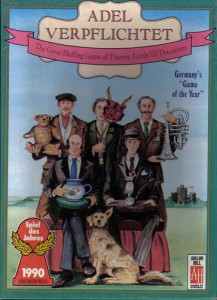
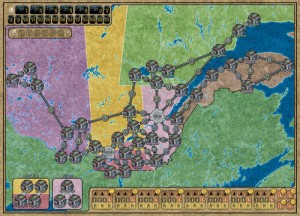
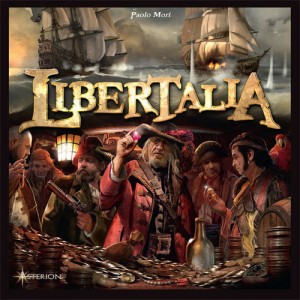

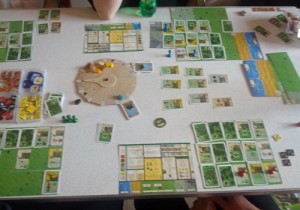
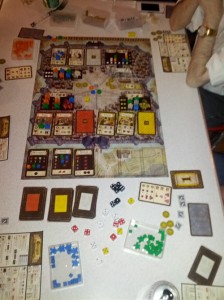

 Follow
Follow
It’s never to late to learn german …
*too
(german is much easier than english)